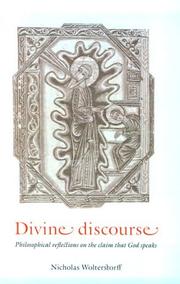| Listing 1 - 2 of 2 |
Sort by
|

ISBN: 9780511598074 9780521475396 9780521475570 9781461949121 1461949122 0511598076 9781107387362 1107387361 0521475392 0521475570 1139882058 1107385059 1107390257 1107383811 1107398673 9781107398672 Year: 1995 Publisher: Cambridge Cambridge University press
Abstract | Keywords | Export | Availability | Bookmark
 Loading...
Loading...Choose an application
- Reference Manager
- EndNote
- RefWorks (Direct export to RefWorks)
Prominent in the canonical texts and traditions of Judaism, Christianity, and Islam is the claim that God speaks. Nicholas Wolterstorff argues that contemporary speech-action theory, when appropriately expanded, offers us a fascinating way of interpreting this claim and showing its intelligibility. He develops an innovative theory of double-hermeneutics - along the way opposing the current near-consensus led by Ricoeur and Derrida that there is something wrong-headed about interpreting a text to find out what its author said. Wolterstorff argues that at least some of us are entitled to believe that God has spoken. Philosophers have never before, in any sustained fashion, reflected on these matters, mainly because they have mistakenly treated speech as revelation.
Speech acts (Linguistics) --- Word of God (Christian theology) --- 21*015 --- 21*015 Theologie en taal --- Theologie en taal --- Illocutionary acts (Linguistics) --- Speech act theory (Linguistics) --- Speech events (Linguistics) --- Language and languages --- Linguistics --- Speech --- God's Word (Christian theology) --- Word of God (Theology) --- Word of the Lord (Christian theology) --- Theology, Doctrinal --- Word (Theology) --- Religious aspects&delete&&delete& --- Christianity --- Philosophy --- Religious aspects --- Christianity. --- Direct discourse in the Bible --- Parole de Dieu (Théologie) --- Discours direct dans la Bible --- Langage et langues --- Actes de parole --- Aspect religieux --- Christianisme --- Arts and Humanities --- Religion --- Speech acts (Linguistics) - Religious aspects - Christianity.
Book
ISBN: 9782708934504 2708934503 Year: 2013 Volume: 47 Publisher: Toulouse Privat
Abstract | Keywords | Export | Availability | Bookmark
 Loading...
Loading...Choose an application
- Reference Manager
- EndNote
- RefWorks (Direct export to RefWorks)
L'acte verbal, entendu dans son sens le plus large (parole, chant, voire écriture), peut revêtir des formes diverses lorsqu'il est "sacré" (qu'il s'adresse à Dieu ou à ses représentants, qu'ils les prenne à témoin, ou encore qu'il soit de leur fait). Il est alors investi d'une ou de plusieurs fonctions qu'il convient de décrypter dans un contexte historique particulier, en même temps qu'il est chargé d'un sens implicite ou explicite. Le présent volume traite donc de la "parole sacrée" sous trois angles différents (formes, fonctions et sens) dans le cadre habituel de Fanjeaux, le monde méridional entre XIe et XVe siècle. Sont abordées des questions telles que les rapports entre parole et image, entre parole et texte, entre parole et musique ou encore entre parole et exégèse, l'utilisaiton du latin ou de la langue d'Oc, la prière, le serment, la prédication, les lectures lors de l'office, la mystique.
Christian spirituality --- Speech --- Communication --- Semantics (Philosophy) --- Word of God (Christian theology) --- Prayer --- Parole --- Sémantique (Philosophie) --- Parole de Dieu (Théologie chrétienne) --- Prière --- Religious aspects --- Christianity --- Congresses --- Congresses. --- History of doctrines --- History --- Aspect religieux --- Christianisme --- Congrès --- Histoire des doctrines --- Histoire --- Theology --- Prayers --- 27 <44> "04/14" --- Christian literature --- God's Word (Christian theology) --- Word of God (Theology) --- Word of the Lord (Christian theology) --- Theology, Doctrinal --- Word (Theology) --- Intension (Philosophy) --- Logical semantics --- Semantics (Logic) --- Semeiotics --- Significs --- Syntactics --- Unified science --- Language and languages --- Logic, Symbolic and mathematical --- Logical positivism --- Meaning (Psychology) --- Philosophy, Modern --- Semiotics --- Signs and symbols --- Symbolism --- Analysis (Philosophy) --- Definition (Philosophy) --- Communication, Primitive --- Mass communication --- Sociology --- Talking --- Oral communication --- Phonetics --- Voice --- Religions --- Church history --- Christian theology --- Theology, Christian --- Religion --- Kerkgeschiedenis--Frankrijk--Middeleeuwen --- Conferences - Meetings --- Sémantique (Philosophie) --- Parole de Dieu (Théologie chrétienne) --- Prière --- Congrès --- Langage --- Parole de Dieu --- Littérature chrétienne --- Prières
| Listing 1 - 2 of 2 |
Sort by
|

 Search
Search Feedback
Feedback About UniCat
About UniCat  Help
Help News
News